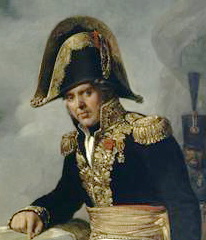Bernard Georges François Frère
Bernard Georges François Frère (born January 8, 1762 in Montréal , † February 16, 1826 in Paris ) was a French general of the infantry .
Life
When the revolution of 1789 broke out , Frère was working as a pharmacist in Carcassonne . In 1791 he joined the army and was soon able to distinguish himself in the revolutionary wars.
When Napoleon was planning his Italian campaign in 1796 , Frère soon became a member of his staff. He fought u. a. at Bassano (September 8, 1796) and was wounded several times.
He later took part in the attempt to take the Îles Saint-Marcouf, Normandy (April 9, 1798). At the end of the same year, Frère was promoted to Général de brigade and took over the grenadiers of the Garde impériale .
He fought off Lübeck (November 6, 1806) and was promoted to Général de division in March 1808 . He took part in the Napoleonic Wars on the Iberian Peninsula . Here he was involved in the siege of Segovia (June 7, 1808) and served as chief of staff of Marshal Jean Lannes . As such he fought u. a. near Saragossa (December 1808 / February 1809).
Frère was then able to return to France to fight in the same year near Aspern (May 21/22, 1809) and in the Battle of Wagram (July 5/6, 1809).
After the battle of Paris (March 30, 1814) and the abdication of Napoleon (→ Treaty of Fontainebleau ), Frère became part of the Bourbons . When Napoleon left the island of Elba and his " rule of the hundred days " began, Frère switched back to the emperor.
After the Battle of Waterloo (June 18, 1815), Frère withdrew into private life. Nor did he strive under King Louis XVIII. a political office under his successor, King Charles X. He died in Paris a few weeks after his 62nd birthday on February 16, 1826, and found his final resting place in the Père Lachaise cemetery .
Honors
- 1809 Comte de l'Émpire
- His name can be found on the southern pillar (25th column) of the triumphal arch on Place Charles-de-Gaulle (Paris).
From 1954 until the French withdrew in 1969, the Langemarck barracks in Koblenz was named after Général Frère (Quartier Général Frère).
literature
- David G. Chandler : The campaigns of Napoleon . Weidenfeld, London 1993, ISBN 0-297-81367-6 (reprint of the London 1966 edition).
- Georges Six: Dictionnaire biographique des généraux & amiraux français de la Révolution et de l'Émpire. 1792-1814 . Saffroy, Paris 1999, ISBN 2-901541-06-2 (reprint of the Paris 1934 edition)
- Digby Smith : The Greenhill Napoleonic Wars Data Book . Greenhill, London 1998, ISBN 1-85367-276-9 .
- Jean Tulard (Ed.): Dictionnaire Napoléon . Fayard, Paris 1995, ISBN 2-213-02286-0 .
| personal data | |
|---|---|
| SURNAME | Frère, Bernard Georges François |
| BRIEF DESCRIPTION | French general of the infantry |
| DATE OF BIRTH | January 8, 1762 |
| PLACE OF BIRTH | Montréal |
| DATE OF DEATH | February 16, 1826 |
| Place of death | Paris |
